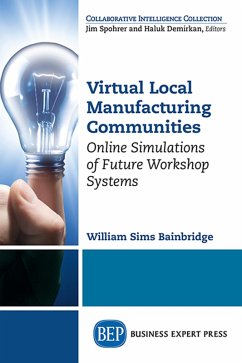This book deeply explores production-capable social media channels, based on thousands of hours of observation and extensive collection of statistical data, extracting hypotheses that may generalize to the real-world distributed manufacturing of the near future.
Distributed manufacturing offers the promise of bringing jobs back to local communities, producing goods that are personalized or harmonize with distinctive cultures, and thereby reversing significant aspects of the globalization that has dominated in recent years. Large corporations may still have important roles to play, but in collaboration with local workshops, providing machinery, software, databases of designs, and communication media suitable for a diverse and dynamic workforce. For years, a set of computer simulation laboratories has flourished, in which millions of people have used virtual machines to produce a great variety of products: massively multiplayer online role-playing games. Their systems are highly diverse, complex, and provide information capable of serious social science analysis.
This book deeply explores 30 of these production-capable social media, based on thousands of hours of observation and extensive collection of statistical data, extracting hypotheses that may generalize to the real-world distributed manufacturing of the near future. This book begins with an overview of this universe of online virtual worlds then demonstrates the principles of virtual manufacturing, modes of work-related communication, socio-economic structures and dynamics, and the function of artificial intelligence in these human-technology systems. It concludes with consideration of the large-scale technical and cultural variation illustrated both by individual examples and by the rather large industry in which they have long been successful.
Distributed manufacturing offers the promise of bringing jobs back to local communities, producing goods that are personalized or harmonize with distinctive cultures, and thereby reversing significant aspects of the globalization that has dominated in recent years. Large corporations may still have important roles to play, but in collaboration with local workshops, providing machinery, software, databases of designs, and communication media suitable for a diverse and dynamic workforce. For years, a set of computer simulation laboratories has flourished, in which millions of people have used virtual machines to produce a great variety of products: massively multiplayer online role-playing games. Their systems are highly diverse, complex, and provide information capable of serious social science analysis.
This book deeply explores 30 of these production-capable social media, based on thousands of hours of observation and extensive collection of statistical data, extracting hypotheses that may generalize to the real-world distributed manufacturing of the near future. This book begins with an overview of this universe of online virtual worlds then demonstrates the principles of virtual manufacturing, modes of work-related communication, socio-economic structures and dynamics, and the function of artificial intelligence in these human-technology systems. It concludes with consideration of the large-scale technical and cultural variation illustrated both by individual examples and by the rather large industry in which they have long been successful.
Dieser Download kann aus rechtlichen Gründen nur mit Rechnungsadresse in A, D ausgeliefert werden.









